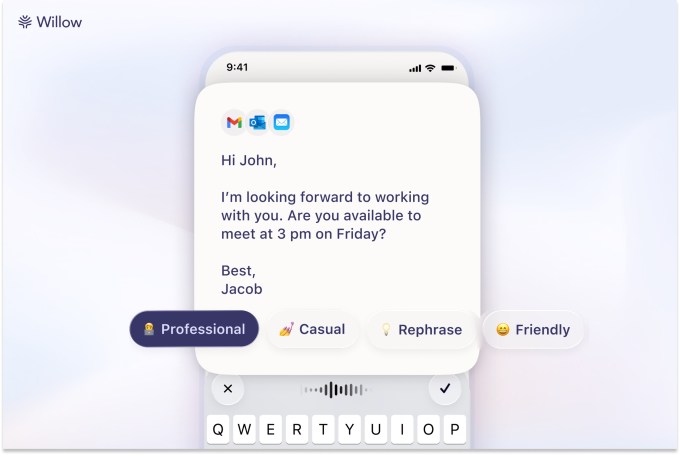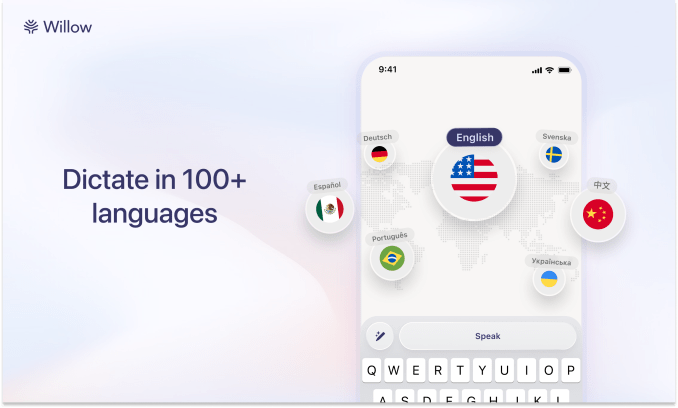One of the most impactful applications that has arisen from contemporary AI models is their enhanced capability to comprehend the human voice, resulting in improved dictation tools. A notable Mac application, Willow, is set to launch an iOS app that allows users to type using their voice in any app.
Like Wispr Flow, Willow’s keyboard converts your speech into text and formats messages based on the context. The app, which accommodates over 100 languages, enables you to establish custom vocabulary or develop various writing styles for different app categories like work, messaging, email, and more.
A significant benefit of Willow’s application is the availability of a complete keyboard for typing, whereas Wispr Flow only features a numeric keyboard. This facilitates quick adjustments to change certain words or sentences instead of having to type them. Additionally, there’s no requirement to switch keyboards when you prefer typing words rather than speaking them.

Willow was established by Allan Guo and Lawrence Liu, who left Stanford to start a company. Guo entered Y Combinator in the summer of 2024 with different co-founders, initially aiming to create software for managing assisted living facilities in healthcare. However, this concept did not materialize, and for a year, the team explored various projects.
“While we were developing healthcare solutions, we observed that doctors utilize voice AI scribes to document patient interactions and generate follow-up documents. After many discussions with medical professionals, they indicated these note-taking tools were quite beneficial. This insight motivated us to create a voice AI solution for knowledge workers and various users,” Guo shared with TechCrunch during a call.
Guo mentioned that he opted against developing another AI notetaker as he believed the market was oversaturated. Conversely, the dictation arena appeared more promising since much communication occurs outside formal meetings. He noted that the firm employs a range of models and focuses significantly on refining its text-to-text pipeline, utilizing Meta’s Llama models for formatting and customization.

The startup then shifted its YC batch to Spring 2025 to unveil the product. The company indicated that since its introduction, it has experienced a 50% month-on-month growth in users. It also counts enterprise clients like Uber, Heidi Health, and Zeg among its users for dictation with capabilities such as custom team vocabulary.
Techcrunch event
San Francisco
|
October 13-15, 2026
Willow has secured $4.5 million from Box Group, Y Combinator, Burst Capital, and angel investors like HubSpot’s Dharmesh Shah; Gusto’s Tomer London; Reddit co-founder Alexis Ohanian; former Yelp COO Kipp Bodnar; Opendoor CEO Kaz Nejatian; Adam Guild, co-founder and CEO of restaurant software firm Owner; and Instacart co-founder Max Mullen.
Mullen expressed his belief that the most extraordinary user interfaces in the future will be dominated by voice.
“I was genuinely impressed with Allan’s vision of not only developing an exceptional dictation app but, in the long run, striving for an interface capable of controlling your computer,” he remarked. “When I compose through Willow, I find I have to make fewer modifications compared to using a computer’s built-in dictation system.”
Mullen highlighted that one of his preferred workflows is that on the desktop, you can utilize the “Hey Willow” assistant to command the app to compose emails in your personal voice.
The startup faces competition from others such as Wispr Flow, which has raised over $56 million in funding thus far; Monologue, included in Every’s subscription package; and the YC-supported startups Aqua, Talktastic, Superwhisper, and Betterdication.
Guo stated that in the upcoming months, the plan involves expanding onto Windows and Android platforms, alongside enhancing personalization to decrease the amount of manual edits users must undertake post-dictation.
